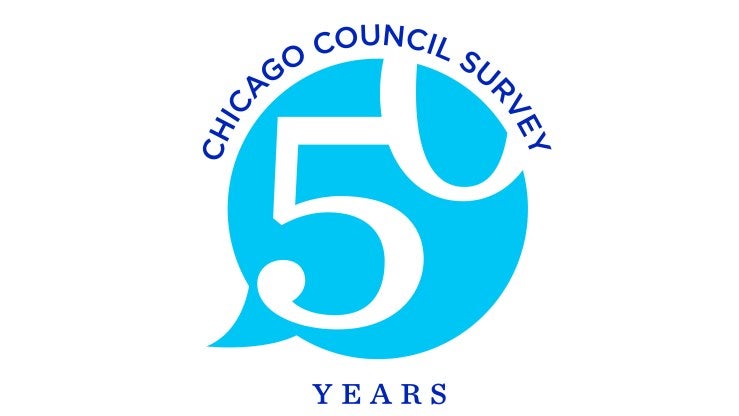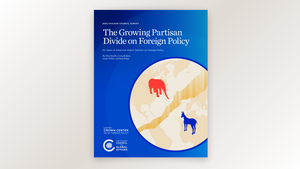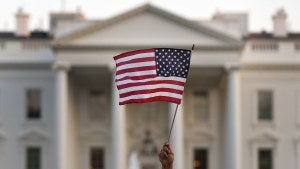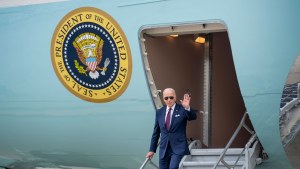At the same time, fewer Americans now compared to a decade ago are convinced their country is exceptional.
While some observers describe US President Donald Trump’s foreign policy outlook as isolationist, others say he just wants the United States to “benefit from its interactions with the outside world.” So far in his second term, there are many examples of Trump trying to engage on global issues. He has inserted himself and the United States into attempts to end wars abroad; taken military action against Iran, the Houthis, and Venezuelan ships allegedly carrying drugs; and brought Saudi Arabia and the United Arab Emirates into an American technology bloc. This à la carte approach to foreign policy, along with the tariffs Trump imposed worldwide and the shuttering of agencies focused on international assistance, makes it difficult to pin down a Trump doctrine.
In this evolving context, what role does the American public think the United States should play in the world? Data from the July 18–30, 2025, Chicago Council Survey shows the American public has grown slightly more likely now than a year ago to favor an active US role in the world and to believe the benefits of maintaining a global role exceed the costs. Open-ended responses highlight various motivations for these views. While some Americans express criticisms of the administration’s America First direction in foreign policy, others applaud this approach and convey confidence in Trump’s foreign policy leadership.
Key Findings
- Americans consider the United States the most influential country in the world, giving it an average score of 8.6 out of 10. China is rated next most influential, with an average of a 7.5.
- Majorities say both US economic power (71%) and military strength (63%)—along with technology (62%)—are key sources of US influence.
- More now than in previous surveys say the benefits of maintaining the US role in the world are greater than the costs (60%, up from 54% in 2024).
- Despite expressed pride in US influence, Americans have become steadily less likely to buy into the idea of American exceptionalism. While a slight majority still say the United States is the greatest country (53%), the percentage saying it is no greater than other countries (currently 46%) has increased steadily since 2012.
- Six in 10 Americans support an active US role in world affairs (60%), up from 56 percent in 2024.
American Influence Stable and Still Highest of All Countries
Before he was elected president the second time, Trump pledged to end “four long years of American decline” from previous President Joe Biden’s tenure. Yet several analysts now point to Trump’s re-election as a symptom of current American decline.
But everyday Americans of all political stripes do not perceive a decline in US influence. As in most years in the past two decades, the US public continues to rate the United States the most influential country in the world. Out of a possible 10 points representing extremely influential, Americans give the United States an average of 8.6. Republicans give the United States a 9.0 on average, higher than Democrats and Independents (who each give a rating of 8.4). These current averages are not that far off from previous measures going back 20 years.
By comparison, the public rates China an average of 7.5, the next highest mark of all the countries included. In this case, Republicans rate Beijing somewhat lower than other partisans (7.3 Republicans, 7.7 Democrats, 7.6 Independents). While there was a sharp increase in influence levels between 2002 and 2010, recent ratings of China have mainly hovered between 7.1 and 7.5.
Economic Power Considered Top Source of US Influence
Americans see US economic power (71%), military strength (63%), and technology and innovation (62%) as the top sources of US influence, followed by international leadership (53%). Fewer than half credit the US political system (44%), economic assistance to other countries (37%), or American culture (34%) as fonts for American clout in the world. In a separate question asking which of just two items, military power or economic might, is the most important determinant for a country’s power and influence in the world, a decisive majority of Americans say economic strength (76%) is most important. Just a quarter choose military strength (24%), continuing a trend in opinion since 1998 (appendix Table 1)
There are some variations in perceptions about the sources of US influence by party affiliation. Republicans (79%), Democrats (69%) and Independents (66%) align on the primacy of US economic power, though Republicans are just as likely to point to US military strength (82%) as a source of US influence. Republicans are also more likely than other partisans to say technology (71%), international leadership (61%), and the US political system (50%) contribute to US influence and are least inclined to point to economic assistance (25%) contributing to US clout. Democrats are more likely than other partisans to believe US economic assistance abroad (48%) and American culture (41%) contribute most to US influence. And Independents resemble Democrats more than Republicans on these items.
While Rejecting Decline, Just Over Half Describe Country as the Greatest
While Americans still see their country as most influential on the world stage, there has been a steady decline in perceptions that the United States is exceptional since the Chicago Council first asked the question in 2012. Down from a high of 70 percent in 2012, just 53 percent of Americans today say the United States has a unique character that makes it the greatest country in the world. Almost half believe the United States is no greater than other countries (46%, up from 29% in 2012).
Partisan divides have been growing on this question. While 83 percent of Republicans say the United States is the greatest country, just 38 percent of Democrats agree.1 This gap of 45 percentage points — the same as in 2020 — is one of the highest levels recorded since the question was first asked. Until 2019, majorities of Democrats also described the United States is the greatest.
Like Democrats, Independents have also become steadily less inclined to characterize the United States as an exceptional country, dropping from 63 percent in 2012 to 45 percent in 2025. While a solid majority among Republicans have continuously viewed the United States as the greatest country, the upturn since 2023, is likely related to the re-election of Donald Trump.
While partisan politics are part of the story in these attitudes, the data reveal that these patterns of declining impressions of American “greatness” emerged regardless of whether an administration was Democratic or Republican. A large majority of Republicans have consistently described the United States as the greatest country regardless of which party held the White House. For their part, Democrats and Independents have become less nationalistic over time, even during the years when Presidents Barack Obama and Biden were in office.
Small Rise in Public Support for Active US Global Engagement
While Americans express tempered confidence in the United States as a world power, considering it influential but less so the greatest country, they are still supportive of US international engagement.
Over the past 50 years, the Chicago Council Survey has been asking Americans whether it is best for the future of the United States to take an active part or stay out of world affairs. This question aims to measure public support for US engagement with other countries and involvement in solving international challenges. Between 2021 and 2024, public support for active engagement had been steadily declining. But this year, 60 percent favor an active US role, up from 56 percent in 2024. At the same time, however, the differences between the two response options have narrowed considerably since Cold War-era levels. Currently four in 10 Americans would prefer the United States stay out of world affairs (40%), on the higher side of previous results.
When respondents are asked why they support an active global role, their reactions vary widely, at times along partisan divisions. But certain themes are consistent regardless of political affiliation.
Some point to the reality of an interlocking globalized world that disqualifies a US retreat from world involvement:
"We live in a global community, with interconnected economies, various alliances and adversaries, and a slew of problems that can only be addressed in a multinational way. We [the United States] also have the world’s largest economy, most powerful military, and huge cultural influence. The idea of retreating from the rest of the world is a pipe dream at best."
"The time of isolationism is over. We live in a global economy. Most people either travel or have family internationally. To think that the problems of other countries don’t affect Americans is short-sighted."
"The world is no longer a place where one country can isolate themselves and not be affected by the outcomes of other countries’ situations."
One potential consequence of a US withdrawal from global involvement universally mentioned is a potential power vacuum that could benefit US competitors: “America stepping back leaves an opening for China and Russia to fill the vacuum,”2 “if we don’t [remain engaged] who knows what other countries might do?,”3 and “if we do not try to influence events, China could gain even more influence.”4
Democrats: The Most Enthusiastic Internationalists Today
As has been the case since 2016, Democrats are the most unequivocal proponents for active engagement among the US public. Though a smaller majority of self-described Democrats (67%) now than between 2018 and 2020 favor an active role (during that time, support for global engagement reached all-time highs for Democrats), a solid two-thirds continue to back US global involvement.
Open-ended responses shed some light on Democrats’ embrace of US engagement, in terms of using its influence to lead in a multinational fashion. “We live in a global economy,” begins a 65-year-old man who describes himself as a Democrat. “So, actions almost always involve multiple countries. Isolationism can’t work in today’s world.”
Others highlight that an active US role doesn’t mean America needs to carry the burden on its own. One 26-year-old male Democratic supporter notes, “we are much stronger if we work together with our allies and create strong relationships.” Another 45-year-old male Democrat takes a swipe at the Trump administration’s treatment of US partners, stating “we cannot survive as a nation without being a part of the global community. We do not have the resources to be entirely self-sufficient, and alienating our allies and trade partners is just horrible policy.” But a 28-year-old female respondent who affiliates as a Democrat highlights the importance of prioritizing domestic concerns, saying, “America has its own issues that need addressed rather than focus on foreign affairs.”
Republicans’ Support for International Engagement Slips from Early Polls
Republicans used to be the most enthusiastic champions of an active US role in world affairs, but since 2015 they have become less positive than Democrats about an active US international role. In fact, the largest slide in internationalist support has occurred among Republicans, with a steady drop every year since 2019. In 2023, for the first time in five decades of polling, a slim majority of Republicans preferred to stay out of world affairs (52%). But in 2024 and 2025, Republican opinion reversed course (currently 59% support an active US role).
With a majority of Republicans currently saying the United States should play an active role globally, many open-ended responses focused on perceptions that the United States has a responsibility to remain involved. A 37-year-old female who identifies as a Republican explained, “We, at least in the past, have been a world leader with vast resources to help others less fortunate and incapable of defending themselves. In the same vein, another 35-year-old woman who supports the GOP remarks, “to think that the problems of other countries don't affect Americans is short-sighted.”
Some self-described Republicans, like this 53-year-old male GOP supporter, appreciate the America First direction in foreign policy: “If we get involved with affairs of another country, they should pay us for our support or services and give no more free rides.” Others make a distinction between isolationism and prioritizing the needs of US citizens. A 26-year-old male Republican comments, “we don't need to be totally isolated from the other countries of the world, but we should ensure the people of our own country are properly cared for and protected before ensuring the same for those of other nations. A 64-year-old woman, who also identifies as a Republican, agrees, “We need to be America First and take care of our people and issues.”
Another line of reasoning is that US interventions abroad aren’t always successful nor appreciated. “Other countries just hate it when we meddle in their affairs,” a 90-year-old male GOP supporter offers. And another 27-year-old male GOP supporter notes, “Other countries don’t intervene in international affairs as much as the United States. Why should we be the exception?”
Independents: Most Inclined to Prefer Avoiding Global Entanglement
Those respondents who describe their political affiliation as either Independent or “other” have generally been the most inclined to prefer to avoid international involvement, though in 2023 Republicans were the most apt to choose this response option.5 This year, a narrow majority of Independents favor an active US role (54%, up from 47% last year), with a sizable 45 percent preferring to stay out, reversing a slight majority in 2024 (52%).
For those who prefer the United States stay out of world affairs, one of the primary reasons is that the government should prioritize problems at home (like other Americans across the political spectrum). “Currently, we are spending immense amounts of money to support the interests of other countries with extremely varied returns for average Americans,” notes one 21-year-old male participant, who identifies as “other” politically. Another 21-year-old male respondent, laments, “I’m sick of our politicians using our tax dollars for wars instead of us.
But some Independents want to circumscribe the actions that the United States takes on a global level. For example, a 38-year-old woman, who identifies as an Independent, puts forth: “When I think of active, I think of just being there of being at the table shaping the future. I don’t want us isolated, but I don’t want us always going in and bombing places either.”
More Now than Last Year Say Benefits of US Global Role Outweigh the Costs
Accompanying the positive swing in support for international engagement over the past year, six in 10 Americans believe the benefits of maintaining the US role in world affairs exceeds the costs (60%), up from 54 percent in 2024.
Looking at partisan breakdowns, Republican Party supporters now show a record high of 61 percent who consider the benefits of the US global role to be greater than the costs. This percentage, up from 49 percent in 2024, perhaps reflects the change from Biden to Trump in the White House. Independents, too, are at a record high percentage (55%) endorsing the benefits of continued US engagement. For their part, Democrats are as convinced as ever about the benefits of the US role, with two-thirds saying the advantages of maintaining this role outweigh the drawbacks (64%).
One 57-year-old male respondent, a self-identified Independent, elaborated on the importance of continuing US engagement. “While there are challenges and costs to being involved in world affairs, the benefits far outweigh them. US leadership on the global stage promotes peace, prosperity, and security not just overseas but also at home. Disengaging would reduce American influence and allow others with different values and interests to shape the world’s future.”
At the same time, however, Americans are deeply divided on whether the United States has ample resources to play a leading role in the world (48%) or whether its resources are limited and should be used to focus on domestic problems (49%). A majority of Democrats believe there are enough resources to address both global and international issues (57%), but a sizable 40 percent disagree. A slight majority of Republicans and Independents think the United States should reduce its international involvement and direct its resources for domestic problems (53% each), though significant percentages disagree.
Responses to open-ended questions also shed some light on these perceptions. One female respondent, age 38, and a Democrat, adds to this theme: “The United States was a world leader in soft and hard policy and used to lead in freedom for people. We have the most resources in the entire world and staying involved means we can influence positively.” A 42-year-old male Republican Party supporter concurs: “We are not self-sufficient. We must have allies that we work with for the betterment of us all. Sharing resources, strategic geography and information is very important.”
But others disagree. One female, age 56, who identifies politically as “other” and remarked, “We are spending entirely too much on spending to protect other countries when we can't even protect or provide for our own citizens.” A 64-year-old female who is a Republican Party supporter echoed this theme: “We can't help everyone, sometimes we just need to take care of our own country.”
Economic Situation in Country and Households a Clear Factor
As previous survey responses underscore, the US economy is seen as a major, if not the most important, factor in Americans’ assessment of the United States’ status as a global power. These survey results further show that the national economic situation is not the only dynamic at play. Americans’ assessments of their personal economic situations also affect their individual attitudes toward an active American role in the world.
When asked to describe how they are “getting by,” 11 percent of Americans say they struggle to buy necessities, 26 percent can buy necessities but not much more. Nearly half (46%) say they can afford a few extras, and 16 percent can afford expensive things. These personal assessments are fairly well distributed across partisan affiliations (appendix Table 3). The figure below demonstrates that those who are better off financially are much more inclined than those who are just getting by or are struggling to support an active US role. For example, seven in 10 who can afford expensive things endorse global engagement, compared to just four in 10 among those who are struggling.
This relationship holds across a number of questions on the US role in international affairs, including cost-benefit judgments on maintaining this role and whether the United States has enough resources to do so and still take care of matters at home.
Conclusion
Americans are fairly self-assured in their country’s international clout. But fewer now believe the United States is exceptional, in part perhaps, because they see that there is active geopolitical competition in a world that is becoming multipolar. Given that Americans believe that the economy is such an important element of US global sway, America's future economic trajectory could impact attitudes on how and when the United States should get involved internationally. In the meantime, Republicans and Democrats currently seem to converge on the importance of maintaining a global role – some because they are true believers in the United States being a force for good, and others because they like the direction in which the US ship of state is sailing.
- 1
Additionally, Generation Z and Millennial Americans are much less likely to consider the United States the greatest country in the world (38% Gen Z, 47% Millennial) than Americans from older generations (57% Generation X, 66% Baby Boomer, 63% Silent Generation).
- 2
Male, 35, Democrat.
- 3
Male, 42, Republican.
- 4
Female, 60, Independent.
- 5
Independents are those respondents who self-identify as Independent or other when asked the question “Generally speaking, do you think of yourself as a Republican, a Democrat, an Independent, or what?”
Appendix Table 1. Most Important Factor in Determining Power and Influence
Q385. Which of the following do you think is more important in determining a country’s overall power and influence in the world:
| Overall | Republican | Democrat | Independent | R-D Gap | |
|---|---|---|---|---|---|
| 1998 | 63 | 65 | 62 | 66 | 3 |
| 2002 | 66 | 70 | 65 | 66 | 5 |
| 2010 | 72 | 65 | 78 | 73 | 13 |
| 2014 | 77 | 69 | 81 | 79 | 12 |
| 2016 | 71 | 58 | 78 | 74 | 20 |
| 2024 | 73 | 61 | 80 | 76 | -19 |
| 2025 | 76 | 60 | 87 | 80 | -27 |
| Overall | Republican | Democrat | Independent | R-D Gap | |
|---|---|---|---|---|---|
| 1998 | 28 | 27 | 30 | 25 | 3 |
| 2002 | 27 | 25 | 29 | 27 | 4 |
| 2010 | 23 | 33 | 19 | 21 | 14 |
| 2014 | 23 | 30 | 19 | 20 | 12 |
| 2016 | 28 | 41 | 22 | 24 | 19 |
| 2024 | 26 | 38 | 20 | 23 | 19 |
| 2025 | 24 | 40 | 13 | 20 | 27 |
Appendix Table 2. US Role in World Affairs
Q3. Do you think it will be best for the future of the country if we take an active part in world affairs or if we stay out of world affairs?
| Overall | Republican | Democrat | Independent | R-D Gap | |
|---|---|---|---|---|---|
| 1974 | 67 | 72 | 68 | 65 | 4 |
| 1978 | 59 | 61 | 58 | 63 | 3 |
| 1982 | 54 | 64 | 49 | 55 | 15 |
| 1986 | 64 | 71 | 58 | 68 | 12 |
| 1990 | 62 | 69 | 61 | 59 | 8 |
| 1994 | 65 | N/A | N/A | N/A | N/A |
| 1998 | 61 | 66 | 61 | 60 | 5 |
| 2002 | 71 | 77 | 70 | 69 | 7 |
| 2004 | 67 | 74 | 65 | 64 | 9 |
| 2006 | 69 | 77 | 65 | 68 | 12 |
| 2008 | 63 | 72 | 59 | 60 | 13 |
| 2010 | 67 | 72 | 68 | 64 | 4 |
| 2012 | 61 | 70 | 60 | 55 | 10 |
| 2014 | 58 | 60 | 64 | 51 | -4 |
| 2015 | 64 | 69 | 67 | 57 | 2 |
| 2016 | 64 | 64 | 70 | 57 | -6 |
| 2017 | 64 | 64 | 69 | 59 | -5 |
| 2018 | 70 | 70 | 75 | 63 | -5 |
| 2019 | 69 | 69 | 75 | 64 | -6 |
| 2020 | 68 | 64 | 78 | 63 | -14 |
| 2021 | 64 | 61 | 68 | 62 | -7 |
| 2022 | 60 | 55 | 68 | 55 | -13 |
| 2023 | 57 | 47 | 70 | 53 | -23 |
| 2024 | 56 | 54 | 68 | 47 | -14 |
| 2025 | 60 | 59 | 67 | 54 | -8 |
| Overall | Republican | Democrat | Independent | R-D Gap | |
|---|---|---|---|---|---|
| 1974 | 23 | 19 | 23 | 26 | -4 |
| 1978 | 29 | 27 | 32 | 26 | -5 |
| 1982 | 35 | 27 | 39 | 35 | -12 |
| 1986 | 27 | 22 | 34 | 22 | -12 |
| 1990 | 28 | 22 | 29 | 32 | -7 |
| 1994 | 29 | N/A | N/A | N/A | N/A |
| 1998 | 28 | 27 | 26 | 31 | 1 |
| 2002 | 25 | 20 | 27 | 26 | -7 |
| 2004 | 30 | 24 | 33 | 30 | -9 |
| 2006 | 28 | 21 | 33 | 30 | -12 |
| 2008 | 36 | 27 | 40 | 40 | -13 |
| 2010 | 31 | 27 | 30 | 34 | -3 |
| 2012 | 38 | 30 | 39 | 44 | -9 |
| 2014 | 41 | 40 | 35 | 48 | 5 |
| 2015 | 35 | 30 | 32 | 42 | -2 |
| 2016 | 35 | 36 | 29 | 41 | 7 |
| 2017 | 35 | 34 | 31 | 39 | 3 |
| 2018 | 29 | 29 | 24 | 35 | 5 |
| 2019 | 30 | 31 | 24 | 35 | 7 |
| 2020 | 30 | 34 | 22 | 35 | 12 |
| 2021 | 35 | 38 | 32 | 36 | 6 |
| 2022 | 39 | 44 | 31 | 43 | 13 |
| 2023 | 42 | 53 | 29 | 46 | 24 |
| 2024 | 43 | 44 | 31 | 52 | 13 |
| 2025 | 40 | 40 | 32 | 45 | 8 |
Appendix Table 3. Personal Economic Situation
QDQX: Which description of how people are getting by best suits your situation?
| Overall | Republican | Democrat | Independent | R-D Gap | |
|---|---|---|---|---|---|
| I struggle to buy necessities | 11 | 9 | 13 | 12 | -4 |
| I can buy necessities, but not much more | 26 | 23 | 28 | 27 | -5 |
| I can afford a few extras | 46 | 49 | 42 | 46 | 7 |
| I can afford expensive things | 16 | 19 | 16 | 14 | 3 |
This analysis is primarily based on data from the 2025 Chicago Council Survey of the American public on foreign policy, a project of the Lester Crown Center on US Foreign Policy.
The 2025 Chicago Council Survey was conducted July 18-30, 2025, by Ipsos using its large-scale nationwide online research panel (KnowledgePanel) in English and Spanish among a weighted national sample of 2,148 adults 18 or older living in all 50 US states and the District of Columbia. The margin of sampling error for the full sample is ±2.2 percentage points, including a design effect of 1.07.
Partisan identification is based on how respondents answered a standard partisan self-identification question: “Generally speaking, do you think of yourself as a Republican, a Democrat, an Independent, or what?”
The data for the total sample were weighted to adjust for gender by age, race/ethnicity, education, Census region, metropolitan status, and household income using demographic benchmarks from the 2024 March Supplement of the Current Population Survey (CPS). The specific categories used were:
- Gender (Male, Female) by Age (18–29, 30–44, 45-59 and 60+)
- Race/Hispanic Ethnicity (White Non-Hispanic, Black Non-Hispanic, Other, Non-Hispanic, Hispanic, 2+ Races, Non-Hispanic)
- Education (Less than High School, High School, Some College, Bachelor or higher)
- Census Region (Northeast, Midwest, South, West)
- Metropolitan status (Metro, non-Metro)
- Household Income (Under $25,000, $25,000-$49,999, $50,000-$74,999, $75,000-$99,999, $100,000-$149,999, $150,000+)
The 2025 Chicago Council Survey is made possible by the generous support of the Crown family and the Korea Foundation.






Related Content
 US Foreign Policy
US Foreign Policy
Results and analysis of the Council's 2025 annual survey of American views on foreign policy.
 Public Opinion
Public Opinion
While most Democrats favor taking an active part in world affairs, Republicans remain divided.
 US Foreign Policy
US Foreign Policy
For the first time, a majority of Republicans think the United States should stay out of world affairs.
